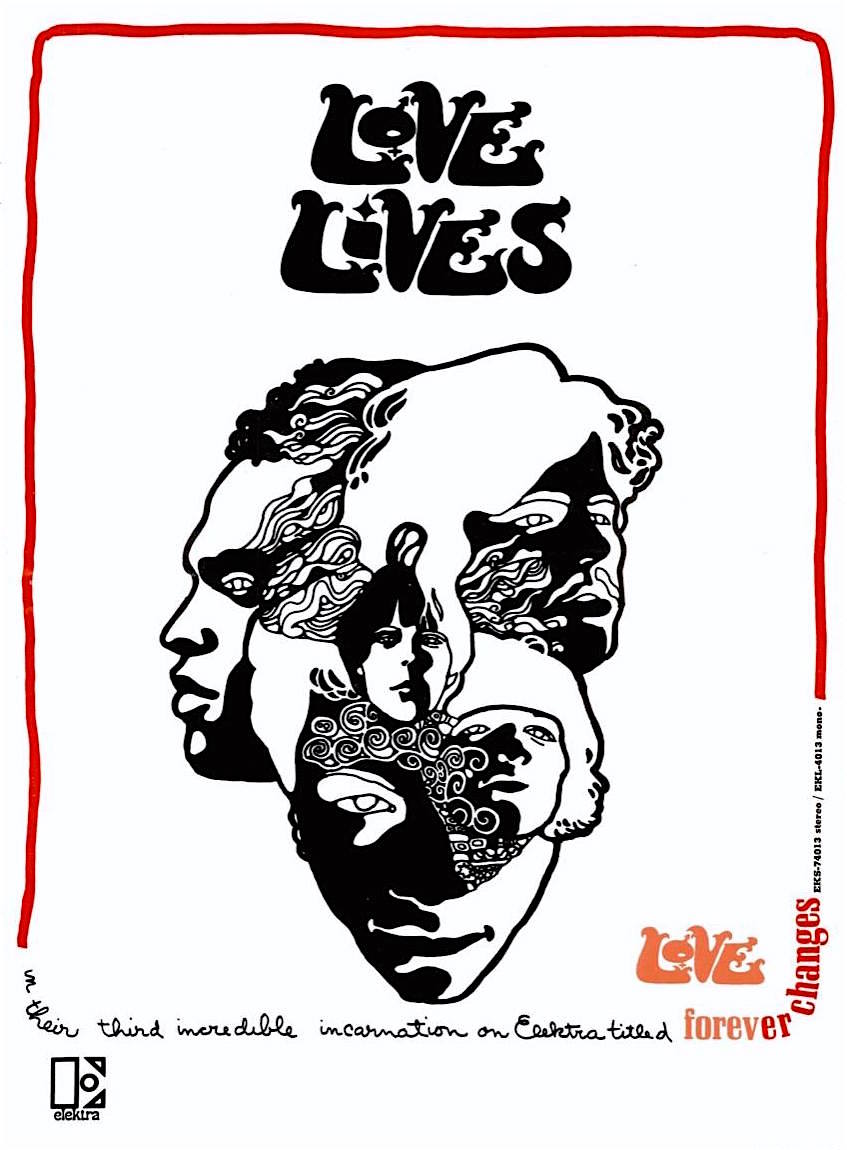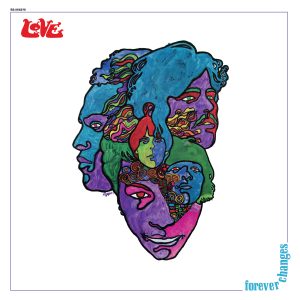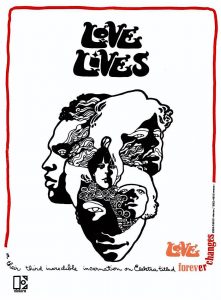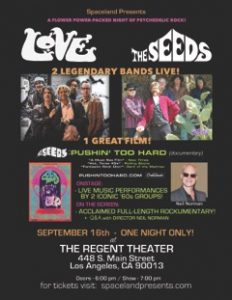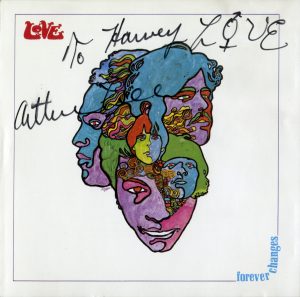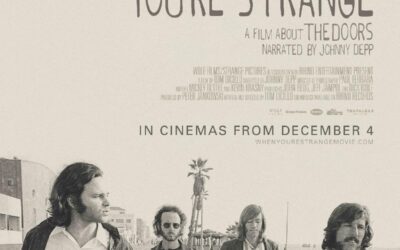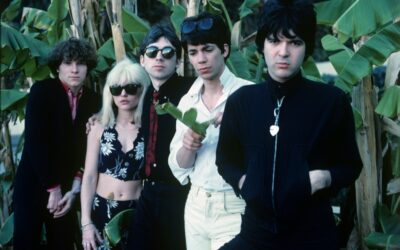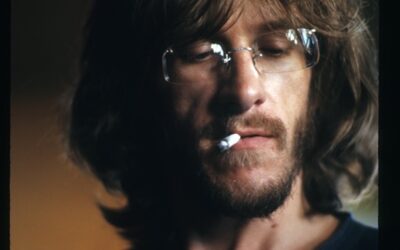Love’s 1967 Masterpiece Celebrated With A 4CD/DVD/LP Collection Packed With Various Mixes Of The Original, Rare And Unreleased Tracks, Plus A 1968 Promo Video
By Harvey Kubernik C 2012, 2017
Love’s FOREVER CHANGES is the psychedelic R&B folk-rock pioneers’ finest achievement. Mostly overlooked when it was released in 1967, today the album is considered an indispensable masterpiece.
In 2008, it was inducted into the Grammy Hall of Fame, and – in 2012 – the Library of Congress added it to the National Recording Registry.
Rhino Entertainment has touted the acclaimed album’s golden anniversary with an extensive 4CD/DVD/LP collection housed in a 12 x 12 hardbound book that features a newly written essay and track-by-track notes by music historian Ted Olsen.
The package features the CD-debut of a remastered version made by its original co-producer and engineer Bruce Botnick, as well as the first-ever release of the mono version on CD.
Also included are alternate mixes of the album, as well as a selection of rare and unreleased singles and studio outtakes. Botnick’s stereo remaster of the original album also makes its vinyl debut on the LP included with this set. It was cut from high resolution digital audio by veteran audio engineer Bernie Grundman at his Hollywood facility.
The DVD that accompanies the anniversary collection includes a 24/96 stereo mix of the album version of the original album remastered by Botnick as well as Your Mind And We Belong Together, a rare promotional video directed by Elektra producer Mark Abramson that was originally released in 1968. List price is $99.98.
Forever Changes is the group’s most fully realized studio effort, featuring Arthur Lee (vocals, guitar), Johnny Echols (lead guitar), Bryan MacLean (rhythm guitar, vocals), Ken Forssi (bass) and Michael Stuart (drums, percussion
FOREVER CHANGES: 50th ANNIVERSARY EDITION boasts more than a dozen rarities, including single versions of “Alone Again Or” and “A House Is Not A Motel” that are available now for the first time since 1967. Two other recordings on the set have never been released: the backing track for “Live And Let Live” and an outtake backing track for “Wonder People (I Do Wonder).”
Forever Changes was produced and engineered by Bruce Botnick with superb string and horn arrangements by David Angel. The album was recorded at Sunset Sound and Western Recorders studios in Hollywood with additional vocal and guitar overdubs at Leon Russell’s home studio.
In my 2017 book, 1967 A Complete Rock Music History of the Summer of Love, drummer and/writer Paul Body described his initial exposure to the potent platter.
“The chill of winter was in the air when Love’s Forever Changes came out. KPPC-FM was playing it to death before it came out. From ‘Alone Again Or’ all the way to ‘You Set the Scene,’ it was a monster. Man, one of the songs mentioned the Eating Affair that place just past the Whisky a Go Go, everybody used to hang there. It was a glorious scene.
“Forever Changes altered the mind, didn’t need any dope, just close your eyes. It was my favorite album from that Summer of Love year. The only drag was that Love was on the verge of falling like stars out of the skies. 1967 was crazy, it was time of Super spade, LSD, hippies, incense, wearing flowers in your hair.”
In the same volume, author Daniel Weizmann enthused, “Most praising their ’67 release focus on the adventurous music, the way it blends high orchestra and low garage.
“But equally unusual is the record’s lyrical p.o.v.– aggressive disillusion in the original sense of the word. Forever Changes is the only album of the Summer of Love that is totally anti-utopian.
“In song after song, Love tests the limits of ‘pop life,’ its inability to save souls. ‘A House is not a Motel’ brings the jungle terror of Vietnam home — literally, home to your bathtub — connecting the bloodshed overseas to the spiritual malaise in the West. In ‘The Daily Planet,’ the sun — the ultimate symbol of good California vibrations — is an agonizing alarm clock to be waited on night after night.
“Then there’s Arthur Lee’s vocals on ‘Bummer in the Summer,’– narrator as cuckold and stray dog, stripped of identity. Like Tommy Wilhelm in Bellow’s Seize the Day, the singer reaches an uneasy satori when he realizes that all spirits are interconnected, shattered mirrors of the human condition.
“It’s been said that Forever Changes is a timeless album, one that rises above its specific environment, etc. Maybe. But I find it hard to separate these dark portraits from Los Angeles in the middle of the sixties.
“Here in the petri dish of ultra-modernism and counterculture, Love touched the edge of the sixties vision first. They were vanguards of a whole new kind of dismantling. The radio was blasting songs about marmalade pies and peppermints and strawberries back then–yummy fantasias for affluent children. Forever Changes unmasked the loneliness, the alienation, and the dread that TV dreams seek to hide.
“The title itself, which can be read about 18 different ways, also turns the idea of limitlessness on its head. There’s something tragic about it, something resigned, and something grown up.”
“Every generation thinks their music was the best. But roll out the LP’s that came out in 1967 and you might have a good argument,” suggests Gene Aguilera, East L.A. music historian and boxing book author Latino Boxing in Southern California.
“Love’s third LP, Forever Changes, was a tasteful lush, acoustic cocktail; mixed together with a dose of era-driven psychedelia. It remains a certified gem that stands toe-to-toe with almost every album that came out that year.
“On a personal level, Bryan Maclean’s opening track Alone Again Or takes me straight to the bullring in Tijuana on a Sunday afternoon; with mariachi horns, tequila shots, and a dozen red roses all thrown in for good measure. But to escape the shadow of their powerhouse Elektra label-mates, the Doors; Arthur Lee and Love should have taken their goods down the block to A&M Records; where the Tijuana Brass/Burt Bacharach people were waiting with open arms. Either way, in ’67, this album by Love, forever changed me.”
“Forever Changes was the final album from the original line-up of Love and although Lee recorded with different versions of Love, none came close to the greatness of Forever Changes,” volunteers Jan Alan Henderson, author of Speeding Bullet, The Legendary Lydecker Brothers, and Crypt 39 (a novel).
“Forever Changes was Love’s Sergeant Pepper but on many deeper levels. A celebration of the 60s and an obituary of those golden days, it was prophetic of what was to unfold in the immediate future. Timeless songs that take the listener through the musical landscape of the past, which proves as poignant today as it did in its time. Unfortunately, after Forever Changes Love didn’t go out on a national tour, or on any international touring. Maybe the funding of an orchestra was prohibitive. Outside of Los Angeles, Love was barely known.
“I vividly remember standing outside The Fifth Estate seeing Arthur Lee and some of Love going in or out of the coffee house, and standing outside the Whisky a Go Go, listening to Love on the sidewalk as was my habit. In June of 1966 I saw an evening show at the Hullabaloo, where the Da Capo era band played the whole album and other early favorites.
“I was with the band for a session for the Four Sail album in late 1969. Arthur and Frank Fayad visited a pad on Glen Holly Drive in Hollywood that some friends and I were hanging out at, the night they found Peter Duel blue at the end of the drive.
“I’ve been Love struck since the first album, and Forever Changes is an undiscovered masterpiece.”
“The album will always be in my top five all-time lists,” exclaims Sirius XM deejay, Rodney Bingenheimer. “When I first heard the promotional test pressing of the LP I thought it was the Byrds’ doing Sgt Pepper’s… Then I got the real album and it sounded only like Love!”
“Arthur Lee with Love served up one of the emblematic albums of 1967 with Forever Changes,” offers publicist Hal Lifson, a former host of KRLA-AM’s Radio A Go Go. “It was cathartic collection of street poetry which reflected the various shades of urban strife and Sunset Strip happenings. The album was a sign of the times and although completely uncommercial in concept, the recording is a defining moment of the 1960s youth culture and social landscape of Los Angeles.”
I witnessed a handful of Love shows in Hollywood, Los Angeles and Santa Monica in 1966 and ’67 with my brother Kenny, and junior high school Mid-Town mate, Peter Piper, now a professional surfer.
Piper at the time served as the parking lot attendant for the Sunset Strip’s The Old World restaurant and the nearby Whisky a Go Go, watched Love regularly at the famed club.
“Right in the middle of all this ‘1967 Hollywood peace, love and sunshine’ created music, there was Love, who reminded us that their alluring, romantic and menacing sound with Forever Changes really captured the darkness of our town,” marveled Peter in 2017.
Johnny Echols is the co-founder of Love, although revisionist history, print and digital documentation has, on occasion, displayed the group as the sole brainchild of Arthur Lee.
To those who saw and experienced the early incarnations of Love, on stage, radio and initially on vinyl, we always felt Echols was the bandleader, far more than a colorist, arranger and co-writer of some Lee tunes.
“In a time of the rise of the guitar player—the sixties—Johnny Echols was right up there with the heavyweights,” underlines Paul Body. “He wasn’t flashy, but he was good. On the Sunset Strip at that time, he was the best. He could do that Byrds thing, and then he could rock it, and then he could jump into a total jazz bag. He could do whatever it took to get the song over.
“On top of that, he sung a mean vocal at the beginning of the song that became ‘Revelation.’ In other words, he could play the guitar like ringing the bell, and if Arthur was the soul of love and Bryan was the heart, Johnny Echols was the heart and soul.”
In 2012 I interviewed Johnny Echols.
Portions of our conversation first appeared in my books Turn Up the Radio! Rock, Pop and Roll in Los Angeles 1956-1972 and 1967 A Complete Rock History of the Summer of Love.
HK: How did the concept of Forever Changes begin?
JE: We started with kind of an idea after hearing the Beatles’ Sgt. Peppers. And we decided that we wanted to do something that had horns and strings and we knew from the very start how this album was going to be. And what we were going to do and that we were going to try to make this what we would consider our magnum opus. This was gonna be the thing that defined us. And it was either we were gonna take off and just go all the way or something was gonna have to happen. We were going to really leave the three minute pop song format. We were getting bored of the three minute rock tune and wanted to push it. We knew with Sgt Pepper’s there was a whole new sonic thing going on. Absolutely.
“The material and concepts of an outline of it were written before we went into the studio. Arthur was not very much of a guitar player. He could play a few chords and basically would sing the songs to me and basically play the outline of them and then I would get together with Kenny mostly and we would work out some structure for the song. Bryan had a way, kind of a counter point that he would do with his finger picking that would work against what we were playing. We would always have the rehearsals with Kenny and me first and then Michael Stuart. We would rehearse with acoustical instruments, or sometimes at a friend of ours who had a house, Joe Clark. He lived in the Valley and we’d go to his place. Sometimes we would rehearse in the daytime at the Whisky. But mostly at one of our houses.
“My role with Arthur and Bryan was basically an ombudsman to kind of keep these two personalities happening.
“So I knew that from the very start to keep. Because they would have been at loggerheads all the time. Because they liked the same chicks, if you listen to some of the songs. That is rock ‘n’ roll. That’s tight, of course, but there was always that strong tension between the two of them and I was always stuck there in the middle kind of keeping the peace but also drawing the best out of them that I could. Because otherwise, you know, Bryan was very much a show tune kind of guy and I knew we could not release show tunes so we had to do a lot of work on his songs to meld then into something that was acceptable to an audience that we were developing.”
HK: Lyrically, new ground was being examined.
JE: Lyrically Arthur was writing some absolutely phenomenal lyrics. I was knocked on my ass. Hell yes it did! Because I am expecting the pedestrian the same old stuff that I’d heard before. Then I started reading these lyrics and looking at them. And this isn’t Arthur I know. A dude that I’d fought with and wrestled around the ground with. This was a poet. And I am listening to this poetry and it was absolutely shocking. Because it just came out of no fuckin’ where and still to this day, and it was only for this brief period of time that it was just profound. After that it was, you know, good and but it was not extraordinary.
“The writing for that brief moment of time was just extraordinary. And I don’t understand it. I’ve asked him over and over and he did not understand. Because he did not realize for ‘Everyone who thinks that life is just a game. Do you like the part you’re playing?’ He did not realize how fuckin’ profound that was. He didn’t know.
HK: It’s an L.A. album with regional influences that reach globally.
JE: Forever Changes could only happen in the city of L.A. And could only happen at that particular point in time. And only in L.A. Because you did have that cosmopolitan freedom, you know, that you didn’t have people necessarily put into little categories and boxes. You were able to go anywhere.
”In the L.A. area you could be able to hear blues one night and go hear rock and go hear experimental or avant garde jazz, or whatever. So you were right in the same area you are exposed to all these different cultures. And also on the radio. If you listened to the radio then the DJ’s were playing Herb Alpert & the Tijuana Brass, they were playing Dick Dale and Frank Sinatra. All on the same radio station. So you were exposed to whole different genres.
“A few session players were on the sessions. What was happening was that that there was a mutiny going on. Bryan wanted more of his songs on the album.
“See, initially Forever Changes was meant to be a two album set. Then towards the time we were able to get to the studio finally Jac Holzman said ‘No they can’t afford it.’ And they were gonna do another album right behind it. But everybody was upset and we had worked on all of this music and now we’re not using. So Bryan was upset and wanted more of his stuff. So he thought that if he kind of held back on Arthur’s stuff and didn’t add the Bryan flourishes that Elektra wouldn’t want to use that song. That’s what started. Elektra booked the studio and said, ‘We’ll bring in the Wrecking Crew and they’ll play the music.’
“So that’s what they did. They played for maybe less than ten minutes and we knew that it just could not work. So those dudes were asked to go and the only ones that stayed were Carole Kaye, Don Randi and Hal Blaine played the drums on one song. And Carole played on one song and Don Randi played with us on a couple of songs. ‘Bummer In The Summer’ and I think ‘Old Man.’ And that was it.
“See, this was the weird thing. We didn’t know for certain that Elektra was gonna come through because they didn’t come through because they didn’t come through with the double album thing. We basically are playing in the dark and kept leaving room for imaginary strings and imaginary horns that we don’t really know. And so we’re doing this all in our head and no charts or anything. We’re leaving room and I’m playing, ‘how will this sound if there isn’t a horn?’ So basically I am playing to how it is going to sound if they don’t come through. I don’t think anybody has recorded a record like that.
“And John Fleck and Michael Stewart were different players. Absolutely. Michael is one of the finest drummers on this planet. And he just knew exactly what to play. He’s a percussionist but a deft percussionist. He’s not one playing all over the solo. (Don) Conka was one of the finest drummers I’ve ever known but he could not have played Forever Changes because he did not have the light touch Michael Stewart had. And John Fleckenstein, too. And Kenny Forssi a phenomenal bassist.
HK: Why does Forever Changes continue to be worshiped and reissued?
JE: My theory on why this album is so popular and in the top ten of all time. The magic of the record is that it is unexpected. It just came all of a sudden there is the atom bomb. You are dealing with regular TNT explosions and all of a sudden you’ve got an atomic bomb. It just pushed the envelope so far outside of the mainstream that it took a while. Now if it had been released in the last few years it would have done a whole, whole lot better commercially ‘cause people are ready for that. But back then people were just kind of stunned. All of a sudden you go from here to there and then stunning Arthur lyrics. Everything was just different. The way the horns were done. The way the jazz was blended in with folk music, was blended in with kind of show tunes and rock ‘n’ roll.
“It was all put together. But also because the times we were living in. We had civil rights movement, we had the Vietnam War. All of this turmoil and out if the turmoil there’s a rose landed in all of this shit. There are assassinations. Martin Luther King, Jr. in Memphis. Robert F. Kennedy in Los Angeles on Wilshire Boulevard. So there we got a rose coming out of all this shit and it is blooming. And it is kind of permeating the air with sweetness.
HK: What have been some of the comments you have heard from fans and record collectors the last fifty years about Forever Changes?
JE: I have heard it all…It’s deep. One of the kind of prevailing things I’ve heard is ‘this is the soundtrack of my life.’ And I think that that is the best definition of it. A soundtrack of the life. Because it was a soundtrack of the times. The music reflected the times we were living in.
“If you listen to ‘A House Is Not a Motel.’ I knew what those words were having been with there when Arthur was with a Vietnam veteran who came back and he was at the Wherehouse in San Francisco, when we were playing with Janis Joplin and he sat down with us and started telling us about ‘how when blood mixes with mud it turns gray.’ And how these kids were dying in the fields and nobody can get to them. And they’re calling out their mother’s name or calling out God’s name or someone’s name. So you hear ‘I hear you calling out my name.’ These kids are calling out to somebody. Anyway, he tells us all of this and Arthur listening to it and when we go back and put the song together we want the music to reflect what somebody felt when they were out in that field by themselves. You know, listening to bombs explode around them and all of the stuff that is happening.
“So I am trying to add to the guitars where you’re hearing staccato guitar playing around the chaos. The way that was done, the first guitar solo I did I didn’t listen to the second one as I am playing the first one so I don’t know what I played the first time and so it is blending in but doing so totally independent of the other solo. And that was done because we wanted to have something that was spontaneous but also reflecting the chaos that was going in peoples’ lives. So that’s one song. And there are others that speak to the insecurity of people, speak to the animosity that is happening to the kids growing up not trusting anyone then people their own age. All of this stuff is happening at the same time.
On September 16th, Johnny Echols and Love perform at the Regent Theater on Main Street in downtown Los Angeles on a film and music booking with The Seeds. The two bands appear with a screening of director Neil Norman’s documentary on the Seeds, Pushin’ Too Hard.
Harvey Kubernik is the author of 14 books. Inside Cave Hollywood: The Harvey Kubernik Music InnerViews and InterViews Collection, Vol. 1 was published in late December 2017, by Cave Hollywood. In March 2018, Other World Cottage Industries published Kubernik’s The Doors Summer’s Gone. This November Sterling/Barnes and Noble publishes Harvey and Kenneth Kubernik’s The Story of The Band From Big Pink to the Last Waltz). .

